- Home
- About Us
- Services
- Treatments
- Acid Reflux
- Allergic Rhinitis
- Alcoholic Fatty Liver
- Ankylosing Spondylitis
- Anxiety / Stress
- Arthritis
- Asthma
- Cervical Spondylitis
- Celiac Infection
- Colitis
- Constipation
- Dermatitis
- Detox Programme
- Diabetes (Madhumeha)
- Hair Fall
- Headache
- Hormonal Imbalance
- Hypertension
- Insomnia
- Irritable Bowel Syndrome
- Lungs Disease
- Migraine
- Neurological Disorder
- Non Alcoholic Fatty Liver
- Obesity Management
- Pain Management
- PCOD
- PCOS
- Sciatica Pain
- Sinusitis
- Skin Disorder
- Slip Disc
- Stress Management
- Thyroid
- Weight Management
- Techno-Ayurveda
- Media
- Blog
- Contact Us
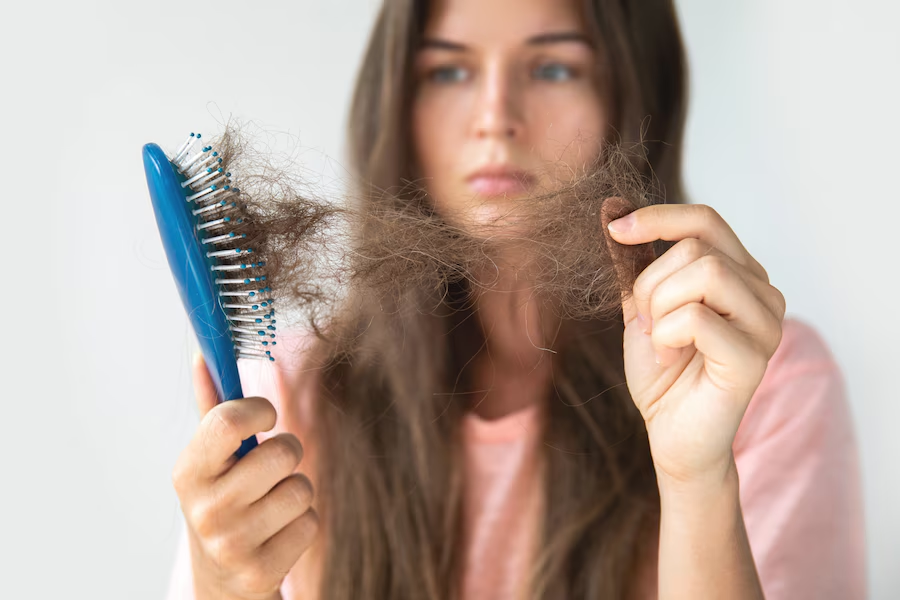
Hair Fall
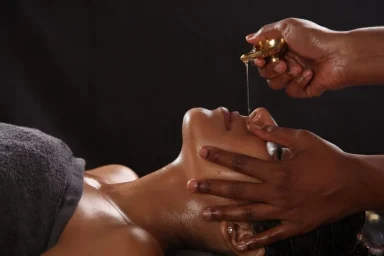
Nasya
Nasya, a key Panchakarma therapy, involves administering medicated oils or powders through the nostrils to detoxify the head, clear sinuses, and balance doshas. It enhances respiratory health, reduces stress, promotes mental clarity, and supports eye and throat health.
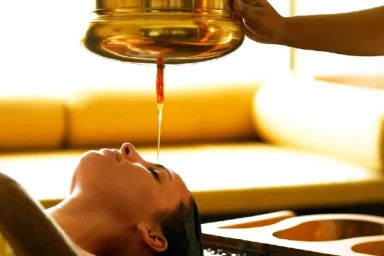
Shirodhara
Shirodhara, a vital Panchakarma therapy, involves a steady stream of warm, medicated oil poured over the forehead. It calms the mind, reduces stress, balances doshas, enhances mental clarity, improves sleep quality, and nourishes the nervous system for overall well-being.

Hot Oil Massage
Hot Oil Massage, a key Panchakarma therapy, involves the application of warm, medicated oils to the body. It relaxes muscles, improves circulation, detoxifies the body, balances doshas, enhances skin health, and promotes overall relaxation and mental well-being.

Diet
A balanced diet is an essential part of Panchakarma therapy. It focuses on nourishing, easily digestible foods tailored to individual doshas. A proper diet supports detoxification, enhances treatment effectiveness, restores balance, improves digestion, and promotes overall health and vitality.
Understanding Hair Fall
Hair fall is a common condition that affects both men and women of various ages. While it’s normal to lose a certain amount of hair every day as part of the hair growth cycle, excessive or abnormal hair fall can be a sign of an underlying health issue or imbalance. Understanding the causes, types, and stages of hair fall is crucial in addressing the problem effectively.
Normal Hair Growth Cycle
Hair grows in cycles, with each strand passing through three primary stages:
Anagen (Growth Phase):
This is the active phase of hair growth, lasting anywhere from 2 to 6 years. During this phase, hair grows about half an inch per month.Catagen (Transitional Phase):
This short phase lasts about 2 to 3 weeks, during which hair growth slows down and the hair follicle shrinks.Telogen (Resting Phase):
In this phase, hair stops growing and remains in the follicle for around 3 months before shedding. Normally, 85-90% of hair is in the Anagen phase, while 10-15% is in the Telogen phase at any given time.
Symptoms of Hair Fall
1. Increased Hair Shedding
2. Bald Patches on Scalp
3. Visible Scalp
4. Thinning of Hair
5. Loss of Hair from Other Body Parts
6. Excessive Hair in Brushes or Drains
7. Receding Hairline
8. Changes in Hair Texture and Quality
9. Gradual or Sudden Hair Loss
Common Causes of Hair Fall
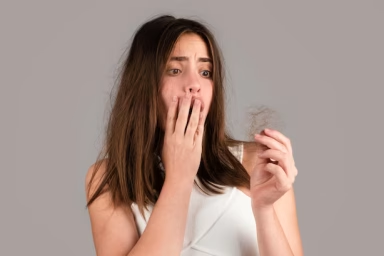
Hair Fall
In Ayurveda, hair fall (or "keshanasha") is viewed as a result of imbalances in the body's internal energies, or doshas (Vata, Pitta, and Kapha). According to Ayurvedic principles, the health of the hair is closely linked to the balance of these doshas, along with the overall state of the digestive system, nutrition, and lifestyle.

Stress and Lifestyle
Stress and poor lifestyle choices, such as irregular sleep, unhealthy diet, and lack of exercise, can disrupt hormonal balance and aggravate Vata and Pitta doshas, leading to hair thinning, excessive shedding, and weakened hair follicles.
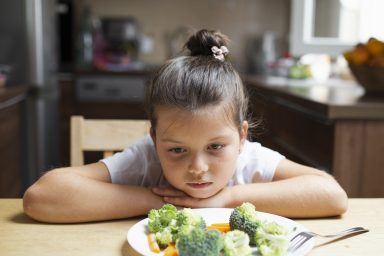
Poor Nutrition
Poor nutrition, characterized by deficiencies in essential vitamins, minerals, and proteins, weakens hair follicles and disrupts hair growth. Lack of nutrients like iron, zinc, biotin, and vitamin D can lead to brittle hair, thinning, and increased hair fall.
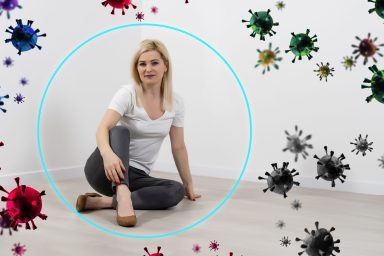
Toxins Buildup
Toxin buildup (ama) from poor digestion, an unhealthy diet, or stress can block hair follicles and disrupt nutrient absorption. This prevents proper hair nourishment, weakening hair strands, and ultimately leading to excessive shedding and thinning of hair.

Improper Hair Care
Improper hair care, such as excessive heat styling, harsh chemical treatments, tight hairstyles, or frequent washing with hot water, can damage hair follicles, weaken hair strands, and lead to breakage, thinning, and increased hair fall over time.
Panchakarma Ayurvedic Treatment for Hair Fall
Hair fall is a common concern that can arise due to a variety of reasons, including nutritional deficiencies, hormonal imbalances, stress, genetics, and environmental factors. In Ayurveda, hair health is closely linked to the balance of doshas (Vata, Pitta, and Kapha) in the body. When the doshas are out of balance, especially Pitta (which governs the metabolic processes), it can lead to hair loss, premature graying, thinning, or dryness. Additionally, poor digestion and the accumulation of Ama (toxins) can further disrupt hair growth.
Panchakarma, the Ayurvedic detoxification and rejuvenation therapy, can be a highly effective treatment for hair fall by cleansing the body, balancing the doshas, and nourishing the scalp and hair follicles. Panchakarma treatments help address the root causes of hair fall, restore vitality to the hair, and promote healthier hair growth.
Herbal Remedies for Hair Fall
Ayurveda uses several herbs to treat hair fall and promote healthy hair growth. Some of the most effective herbs include:
- Bhringraj (Eclipta alba): Known as the “king of herbs” for hair growth, Bhringraj is used to nourish the scalp, promote hair strength, and reduce hair fall.
- Amla (Indian Gooseberry): Rich in Vitamin C and antioxidants, Amla helps strengthen hair follicles, prevent premature graying, and support overall hair health.
- Brahmi (Bacopa monnieri): Known for its calming and nourishing properties, Brahmi helps to reduce stress and enhance hair strength.
- Neem: Neem has antibacterial and anti-inflammatory properties that cleanse the scalp, reduce dandruff, and help promote hair growth.
- Fenugreek: Known for its high protein and nicotinic acid content, fenugreek helps strengthen hair and prevent hair loss.
Ayurvedic Dietary Recommendations for Hair Health
- Consume hair-strengthening foods: Incorporate foods rich in iron, zinc, protein, and vitamins (such as spinach, nuts, seeds, beans, and dairy products) to nourish the hair from within.
- Include healthy fats: Healthy oils like ghee, olive oil, and coconut oil can nourish the scalp and promote hair growth.
- Avoid excess spicy, salty, and oily foods: These can aggravate Pitta dosha and contribute to hair loss.
- Stay hydrated: Drink plenty of water and herbal teas like Amla tea, Nettle tea, or Rosemary tea to detoxify the body and improve circulation to the scalp.
FAQs of Hair Fall
Hair fall can be caused by various factors, including genetics, hormonal changes, stress, poor nutrition, medical conditions (like thyroid issues), and improper hair care. Environmental factors and certain medications can also contribute.
Stress can trigger a condition called telogen effluvium, where hair prematurely enters the shedding phase. Chronic stress can also imbalance hormones, particularly cortisol, which can disrupt the hair growth cycle, leading to excessive shedding and thinning.
In many cases, hair fall can be reversed or managed, especially if caught early. Addressing underlying causes such as hormonal imbalances, nutritional deficiencies, or stress can help restore hair growth. Treatments like medications, hair transplants, and lifestyle changes can also help.
